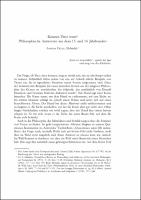Chapter Können Tiere irren? Philosophische Antworten aus dem 13. und 14. Jahrhundert
| dc.contributor.author | Oelze, Anselm | |
| dc.contributor.editor | Speer, Andreas | |
| dc.contributor.editor | Mauriège, Maxime | |
| dc.date.accessioned | 2022-04-05T12:46:33Z | |
| dc.date.available | 2022-04-05T12:46:33Z | |
| dc.date.issued | 2018 | |
| dc.identifier | ONIX_20220405_9783110592191_15 | |
| dc.identifier.issn | 0544-4128 | |
| dc.identifier.uri | https://library.oapen.org/handle/20.500.12657/53743 | |
| dc.language | German | |
| dc.language | English | |
| dc.language | French | |
| dc.relation.ispartofseries | Miscellanea Mediaevalia | |
| dc.subject.classification | thema EDItEUR::N History and Archaeology::NH History::NHB General and world history | en_US |
| dc.subject.classification | thema EDItEUR::N History and Archaeology | en_US |
| dc.subject.classification | thema EDItEUR::3 Time period qualifiers::3K CE period up to c 1500 | en_US |
| dc.subject.classification | thema EDItEUR::Q Philosophy and Religion::QD Philosophy::QDH Philosophical traditions and schools of thought::QDHF Medieval Western philosophy | en_US |
| dc.subject.classification | thema EDItEUR::Q Philosophy and Religion::QD Philosophy::QDT Topics in philosophy::QDTK Philosophy: epistemology and theory of knowledge | en_US |
| dc.subject.classification | thema EDItEUR::Q Philosophy and Religion::QR Religion and beliefs::QRM Christianity | en_US |
| dc.subject.classification | thema EDItEUR::Q Philosophy and Religion::QR Religion and beliefs::QRA Religion: general::QRAX History of religion | en_US |
| dc.subject.other | Medieval philosophy | |
| dc.subject.other | history of science | |
| dc.subject.other | epistemology | |
| dc.subject.other | medieval studies | |
| dc.title | Chapter Können Tiere irren? Philosophische Antworten aus dem 13. und 14. Jahrhundert | |
| dc.type | chapter | |
| oapen.abstract.otherlanguage | The volume is a comprehensive evaluation of epistemic, practical, veridical issues from the perspective of every kind of failure, disruption, or confusion that comes under the general rubric of “error.” The analysis is not limited to the element of negativity, but rather, an inquiry about the extent that error can be transformed into a starting point or precondition for successful epistemic practices. | |
| oapen.identifier.doi | 10.1515/9783110592191-014 | |
| oapen.relation.isPublishedBy | 2b386f62-fc18-4108-bcf1-ade3ed4cf2f3 | |
| oapen.relation.isFundedBy | 178e65b9-dd53-4922-b85c-0aaa74fce079 | |
| oapen.relation.isbn | 9783110592191 | |
| oapen.relation.isbn | 9783110590579 | |
| oapen.relation.isbn | 9783110590678 | |
| oapen.collection | European Research Council (ERC) | |
| oapen.imprint | De Gruyter | |
| oapen.series.number | 40 | |
| oapen.pages | 16 | |
| oapen.place.publication | Berlin/Boston | |
| oapen.grant.number | 637747 | |
| oapen.grant.acronym | RiP | |
| oapen.grant.project | Rationality in Perception: Transformations of Mind and Cognition 1250-1550 |

